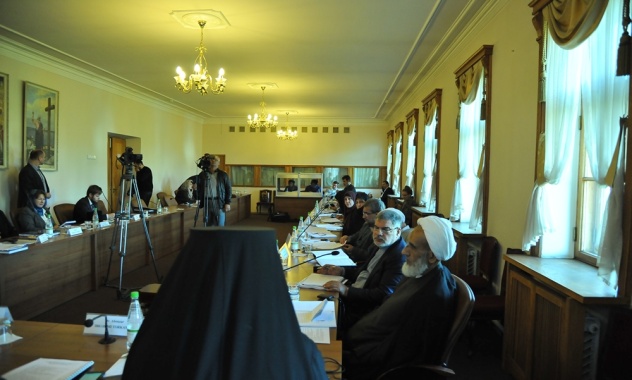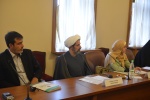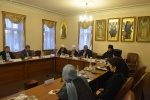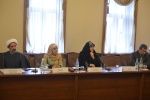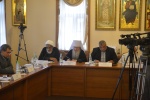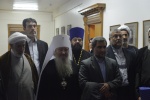Communiqué of the 10th meeting of Joint Russian-Iranian Commission for Orthodoxy-Islam Dialogue
On 26-27 September 2016, the Joint Russian-Iranian Commission for Orthodoxy-Islam Dialogue held in Moscow its 10th meeting on Interfaith Dialogue and Cooperation as Instruments for Achieving Lasting and Just Peace. The session was chaired by Metropolitan Feofan of Kazan and Tatarstan and Dr. Abouzar Ibrahimi Torkaman, head of Iran’s Islamic Culture and Relations Organization.
The delegation of the Russian Orthodox Church included Archbishop Feofilakt of Pyatigorsk and Cherkessk; Archimandrite Alexander Zarkeshev, rector of the Church of St. Nicholas the Wonderworker in Tehran; Rev. Dimitry Safonov, secretary for interreligious relations of the Moscow Patriarchate’s Department for External Church Relations; archpriest Alexy Belotserkovsky, lecturer at the Samara Theological Seminary; Rev. Ioann Vasilyev, head of the Chair of Islamic Studies of the Kazan Theological Sminary; Ms Yelena Dunayeva, senior researcher at the Institute of Oriental Studies of the Russian Academy of Sciences; and Mr. Iliya Kashitsyn, DECR staff member.
The Iranian delegation included Ayatollah Mohammad Ali-Taskhiri, Councellor of the Supreme Leader of Iran; Ayatollah Prof. Ahmad Beheshti of the Islamic Academy in Iran; Dr. Mohsen Ismaili, member of Iran’s Assembly of Experts; Dr. Ahmad Ahmadi, head of the SAMT Publisher; Prof. Dr. Seyyede Fateme Tabatabai of the Tehran University, and Mrs. Zahra Rashidbeigi, head of the Department for Orthodox Christianity and Protestantism in the Center for interreligious dialogue of Islamic culture and relations organization.
The participants in the meeting representing the two Abrahamic religions, Orthodox Christianity and Islam, delivered reports, in which they, basing themselves on the Bible and the Quran respectively, reflected on the understanding of a lasting and just peace within the Orthodox and the Islamic traditions, as well as on some theoretical and practical aspects of the interfaith dialogue in Russia and Iran, and spoke on the defence of religious minorities in the context of the interfaith dialogue and the role of cultural cooperation in preventing extremism.
Both sides noted the growing topicality of the interfaith dialogue, which builds bridges between the followers of different religions. Having discussed the ways to promote the dialogue in Russia and Iran, the participants emphasized the current high level of interreligious relations and the importance of sharing practical experience.
The delegates agreed that common moral values served as a basis for the Orthodox-Muslim cooperation and pointed out that the interfaith dialogue was mainly aimed at establishing just peace.
The participants in the meeting noted the threat of the extremism under religious slogans striving to destroy the centuries-old relations between Christians and Muslims. As was emphasized during the session, the extremism can in no way be identified with religion, since what marks any religion is love for the neighbor, respect for other people’s views and peacemaking efforts. The delegates condemned the practice of using religious slogans as instruments for legitimizing unjust and aggressive actions and called to uphold and promote peace and accord among the religions.
The representatives of the Russian Orthodox Church and Iran expressed their concern over the fact that the expulsion of Christianity in the Middle East and North Africa had increased in scale, and discussed the manifestations of Islamophobia in the Western world, aimed at restricting people’s abilities to profess their faith. Special attention was given to the fate of religious sites and shrines: the participants expressed their regret over the destruction and desecration of the Christian and the Islamic shrines in the Middle East, especially in Syria and Iraq. They resolutely denounced the extremists’ and terrorists’ actions and called upon the Christian and Muslim communities to show support to the persecuted religious minorities. The members of the delegations emphasized that the defence of the religious minorities from oppression was an important contribution to the promotion of the interfaith dialogue.
The participants in the meeting noted the importance of cooperation in the academic and cultural spheres for developing the dialogue. As they pointed out, it is necessary to raise future religious leaders and believers in the atmosphere of tolerance, openness to dialogue and mutual respect, so that in future Christians and Muslims could cherish the tradition of peaceful and neighbourly relationships. The members of the delegations agreed to intensify academic exchange between theological schools of Russia and Iran. As the participants noted, the activities of the Joint Russian-Iranian Commission for Orthodoxy-Islam Dialogue have become a subject of research at the theological higher education institutions of the two countries.
The members of the delegations of the Russian Orthodox Church and Iran condemned the practice of obtruding secular norms and standards of behavior, unacceptable for the adherents of traditional morality. The participants in the meeting noted that the attempts to build a peaceful and just society without religion failed. The current crisis in the West is caused by the politicians’ short-sighted attempts to secularize the society. Such position meets rejection among the followers of the traditional religions and inevitably leads to the growth of tension and conflicts.
The participants in the meeting expressed their satisfaction over the progress of the dialogue between the Russian Orthodox Church and the Muslim community of the Republic of Iran. As they noted, the Commission has achieved much for the past twenty years, having made its contribution to the development of friendly relations between the peoples of Russia and Iran. The delegates rated highly the fundamental role of His Holiness Patriarch Kirill of Moscow and All Russia and Ayatollah Mohammad Ali-Taskhiri in the establishment of the Joint Commission twenty years ago. A wide range of topics on the Commission’s agenda and an active mutual interest are signs of significance of the dialogue these days.
The 11th session of the Joint Commission for Orthodox-Islam Dialogue is expected to take place in Tehran in 2018.
Other events
-
28.09.2016 18:30Communiqué of the 10th meeting of Joint Russian-Iranian Commission for Orthodoxy-Islam Dialogue
-
28.09.2016 08:52Metropolitan Hilarion meets with delegation of Islamic Republic of Iran who have come to Moscow for 10th session for Russian-Iranian commission for Orthodoxy-Islam dialogue
-
27.09.2016 12:44Patriarch Kirill meets with leaders of the Iranian delegation to the 10th session of the Joint Russian-Iranian Commission for Dialogue ‘Orthodoxy-Islam’
-
26.09.2016 18:41His Holiness Patriarch Kirill’s greetings to participants in the 10th meeting of Joint Russian-Iranian Commission for Orthodoxy-Islam Dialogue

















